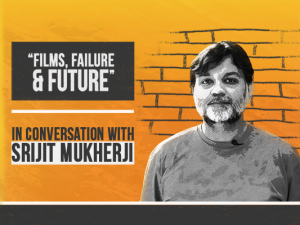Sanchari Vijay who after completing his engineering took up the job of a faculty but soon realised his true calling, thus he left his job and joined theatre.
Sanchari Vijay's years of experience playing diverse characters, mingling with the dynamics of the stage allowed the theatre actor in him to be well equipped in terms of acting skills in cinema. The National Award winner has been instrumental in the theatre scene of the country and has played some of the best strong characters in Kannada movies. He has also appeared in Telugu and Tamil film industries.
...a few of the locals came over and asked us if we faced any difficulty because the area was known for the presence of king cobras.
Speaking with The Moviean, the multi-talented actor discusses his latest film, ' 6ne Maili '.
" 6th mile is the stone that is found next to highways. The movie is a suspense thriller movie directed by debutant Srinivas. The film is based on the trekking culture, which is a craze amongst the youngsters. 70 percent of the story is based on a real incident. It revolves around a group of friends who trek without any particular destination. Near the 6th milestone, people disappear. Whether they are returning or not, that is the main line of the movie title."
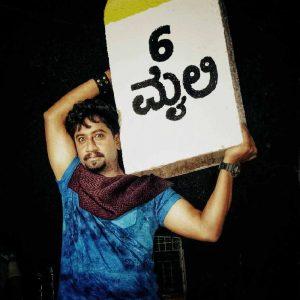
About the characters in the film, Sanchari says that, the tendency to keep challenging himself with new roles has borne fruits for him, who is one of the only three Kannada artists to have won a National Award in the category of best actor for his performance as a trans character in the 2015 movie Naanu Avanalla...Avalu. His nomination was amongst the likes of Mammootty and Bollywood superstar Aamir Khan. Despite such established and strong competition, Sanchari won the battle.
A no small feat in itself, his versatility is shown when he brings his performances on the big screen. From playing a farmer to taking on the role of a transgender, Sanchari has not been afraid of challenges. In this instance, again, he takes on the role of a trekker, albeit with a slight twist. He says regarding the role and its preparation:
"I play a character that leads a team of trekkers. In the second half, I'm a different character, but that's the most I can say. It will surprise the audience. As for the character's preparation, I used to trek much earlier, during my college days, so I knew few things about trekking. But in order to get into the skin of my character, I collected information from other trekkers, about their preparation and their motive behind trekking. And since it's a content-based movie, there are fewer dialogues, so it's all about expressions, which as an actor is one of the most exciting as well as challenging part. To express and emote is what makes an actor, so in a film like 6ne Maili if any actor fails to give the right expression, the actor will surely disappear. But again most of the artists are from the theatre background. They are well acquainted with their characters. Each character has his or her own weightage, so I can't say that I'm playing the hero in the movie. I play two shades. The first half has two episodes, and the second half has one episode. It is a non-linear screenplay; it is in a reverse order."
For the first time in Kannada film history, we have done the music for the film from the Metropolis studio in London. This is a studio known for a lot of Grammy award winners recording their songs here.
Sanchari also brought in the supportive nature of such a new cast, in the face of adversity. Talking about the presence of wild animals and the pitch darkness, Sanchari then shares an anecdote:
"After the shoot was over, during the early morning, we were drinking tea and preparing to leave. Then, a few of the locals came over and asked us if we faced any difficulty because the area was known for the presence of king cobras. Hearing this, everyone was shocked!"
"The shooting in the Western Ghats, at night, was the most difficult. It was pitch dark so we had to manage with fewer lights. Somehow, we managed all the hurdles."
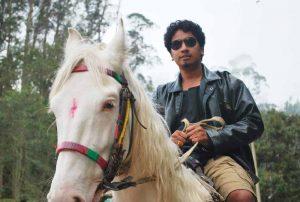
6ne Maili', is the first Kannada film whose music mastering and mixing was done in Metropolis studio, London. According to Sanchari, "Metropolis studio is where many Grammy award-winning songs were recorded."
Moving on from the details of the film to the details of his life, Sanchari states that acting was actually not the first thing on his mind. Yet, a National Award in his favour does seem like he made the right decision.
"I never actually thought I'd get into acting. I had a habit of watching movies as a kid. If I liked any character in the movie, I would enact the character. This got inculcated in me. After my engineering degree was completed, I became a faculty member of a college. So when I was living next to my friends, I used to pull their legs by imitating different characters. One of my friends asked me why I didn't try my hand at cinema and theatre, that's how theatre happened to me. I kept getting minor roles to play in the cinema but I struggled to create any substantial impact for quite a few years, despite showing my calibre. Then an opportunity came when I was least expecting about it, and that is to work for Manso Re in 'Harivu'. The film won a National Award. Soon it was followed by 'Naanu Avanalla...Avalu' and got the National Award for Best Actor.
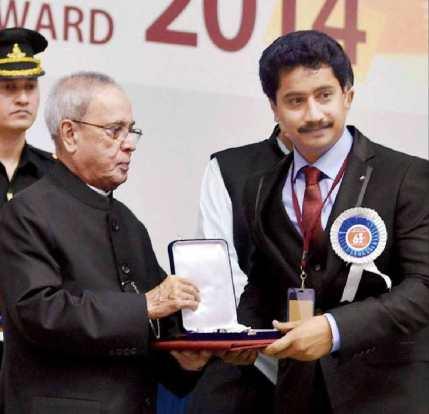
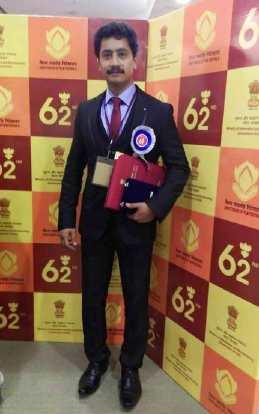
His hard work and determination to succeed were very much evident from the moment he had thoughts of setting foot in the film industry. However, the idea of working a simple 9 to 5 job never seemed to appeal to him. Sanchari talks about what he could have done if he had not been an actor.
"After I completed my engineering, I wanted to work for an engineering company. But I ended up working as a faculty member.
I was also learning Carnatic and Hindustani music for a few years. I tried for a few reality shows but I couldn't qualify. Then I realized that it was not my cup of tea. I had a lot of problems while singing, so they told me to work for theatre as well."
The beauty of regional films is that the stories are very much rooted yet have a universal appeal to it
Sanchari after making the right noise in the Sandalwood is looking forward to his ventures in other language films.
"I would like to say that I don't have any barrier the only criteria is a good script, and I'm on for the project. Currently, I'm doing a Malayalam movie called 'Theatre' by Sarun Kumar, with a very sincere crew and good content. I've also in hand a Telugu movie and a multilingual movie with a combination of Hindi, Tamil, Malayalam, Kannada and two other languages, called 'Firangipura', which was shot in Thailand. It is always fun to move out of my comfort zone and try something that challenges me as an actor and as a person."
Sanchari Vijay, in part, could owe his huge success to a large number of regional A-list directors that he has worked with. These include the likes of Manso Re, and Prakash Raj. His on-screen chemistry and pairing with actresses such as Shveta Desai and Yagna Shetty have also helped. Although he has made his mark in the Kannada film industry and is set to carve a niche for himself in other regional industries such as the Malayalam and Telugu film industry, Sanchari is yet to receive an offer from Bollywood. However, considering his rapid growth in the general film industry, it won't be long before he makes an impact in the big league. Sanchari states:
"Yes, I'm expecting (an offer from Bollywood) but I don't know when that will happen. I've got other projects right now, but none in Hindi. I'm in touch with some directors and they said that they're working on a Hindi project with me in mind."
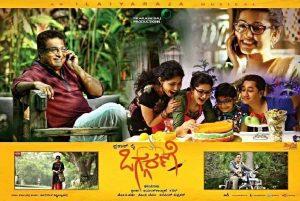
As Sanchari waits for his call-up to Bollywood, he names a few directors and actresses whom he would like to work with, in bigger and more well funded projects.
" Rajkumar Hirani is there. Other directors like Suri, Pavan Kumar are also on my wishlist. As for actresses, I want to work with Kangana, since she's a good performer. She's a real talent, and we won the National Award in the same year. Then there's Priyanka Chopra, who is marvellous, and look where she is today purely based on her talent and her attitude."
Regardless of the fact that Sanchari is yet to make his Bollywood debut, he continues to be one of the biggest names in the Sandalwood. In today's day and age, with social media adding fuel to the popularity fire, Vijay's stardom has skyrocketed since his performance earned him a National Award. He talks about what is the best and the worst thing about his life as an actor, especially after his recent popularity surge. His answer implies two sides of the same sword.
"The worst thing is that we don't have privacy. If you're a public figure, your privacy is less. People are eager to know about your life. This is what I felt. The best part is the recognition that I get wherever I go."

At the heart of greater exposure for independent and regional films, there lies the advent of online streaming platforms. It has often been said that the core of India's film culture belongs to the regional cinema, and not mainstream Bollywood. Sanchari Vijay also believes that regional cinema's importance to the nation is paramount. Such online platforms act as a pedestal so that the millennial and tech-savvy generation can now be more aware of other cinematic projects in the country. He says,
"The beauty of regional films is that the stories are very much rooted yet have a universal appeal to it. For example, in 'Harivu', the character of a farmer takes his ailing son to Bangalore for treatment. They take him to a hospital, which says that it's too late to save him. He is then shifted to a government hospital. The farmer then faces a dilemma on how to take the body of his dead son to his hometown. People do not know about this, and this is based on a real-life incident. Stories like these are in abundance in our country, so other than cinema how else do we bring such incidents to a larger audience. So we have to pick a few elements from a region and show it to the world. We need to understand the culture and problems of a region."
Also, READ/WATCH other INTERVIEWS:

